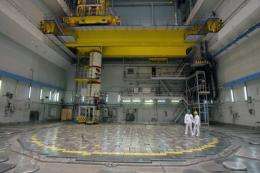Lithuania to hold referendum on new nuclear plant

Lithuania's parliament on Monday called a referendum on plans for an atomic power plant to replace a Soviet-era facility closed under the terms of Lithuania's entry into the European Union.
Sixty-two lawmakers voted in favour of the opposition proposal to hold the referendum, which will not be binding, in tandem with the Baltic state's general election on October 14, while 39 were against and 18 abstained.
"Visaginas nuclear power plant will be built on Lithuanian land, with increased danger, therefore we must ask the opinion of the Lithuanian people," said opposition Social Democrat Birute Vesaite.
Lithuania's governing Conservatives opposed the referendum plan, accusing the opposition of simply seeking pre-election political gains.
"For some, getting into parliament for four years is more important than ensuring Lithuanian energy independence, and economic and political independence for half a century," Foreign Minister Audronius Azubalis said during the debate.
The government will not be bound by the results of the referendum, but the vote may add uncertainty to the already-sluggish nuclear project, which lacks strong support from opposition parties that lead the election polls.
At the end of 2009, Lithuania closed its only nuclear power plant, located near Visaginas in the northeast.
The shutdown was one of the terms of Lithuania's 2004 admission to the European Union.
A referendum on extending the old plant until a new one was ready was held alongside the last general election in 2008, but while 89 percent voted in favour, turnout was only 48 percent, rendering it invalid.
Closing down the plant, which provided most of Lithuania's power, has left the nation of three million reliant on energy supplies from Russia, with whom ties have been rocky since independence two decades ago.
Last month, Lithuania's parliament backed a deal with Japan's Hitachi on a new plant at Visaginas -- expected to generate 1,350 megawatts from 2020-2022, though final investment decisions are not expected until 2015.
The plan foresees a 20-percent stake in the project for Hitachi, 38 percent for Lithuania, with fellow Baltic states Estonia and Latvia getting 22 and 20 percent respectively.
(c) 2012 AFP




















